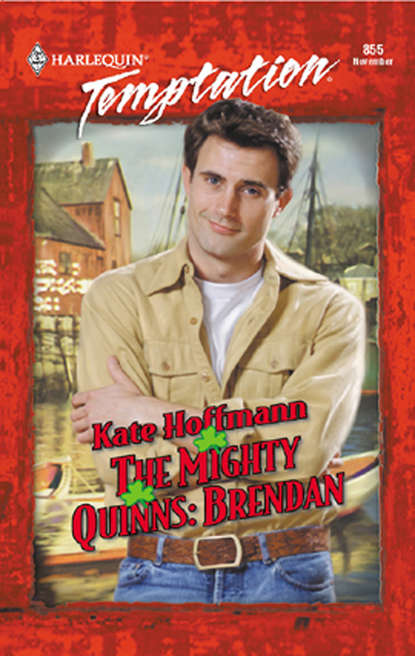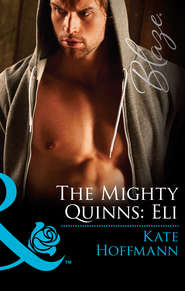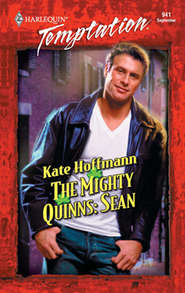По всем вопросам обращайтесь на: info@litportal.ru
(©) 2003-2024.
✖
The Mighty Quinns: Brendan
Автор
Год написания книги
2019
Настройки чтения
Размер шрифта
Высота строк
Поля
“I was winnin’ for sure until I knocked Angus half-senseless.” Brendan chuckled. “Then he fell on top of me. Like a big tree. And when he hit the ground, I felt the earth shake. I swear I did! Just like that giant, Fomor, in the story of Mighty Odran Quinn.”
Liam’s eyes brightened at the mention of one of the Mighty Quinns. Liam loved the stories. For as long as Brendan could remember, the stories had been part of their lives. They’d started after his mother had walked out. At the time, Brendan hadn’t made the connection, but as he got older he realized that Seamus Quinn’s tall tales about their mighty Quinn ancestors were nothing but cautionary tales meant to warn his sons about the dangers of love.
After Fiona Quinn had walked out nearly eight years ago, life had never been the same. Though Con and Dylan had memories of her, Brendan had only been four years old. He had vague images of a dark-haired woman who sang songs and made him cookies. He remembered a birthday cake in the shape of a car. And a beautiful necklace she always wore. But beyond that, Brendan had relied on his older brothers for a picture of his mother for there were no mementos of her left in the house.
She was beautiful and affectionate and understanding, all the best qualities magnified a hundred times in their imaginations. Alone at night, he and Con and Dylan used to wonder aloud whether she might still be alive, whether she had miraculously walked away from the auto accident that his father insisted had claimed her life. Brendan liked to believe that she had amnesia and that she was living another life with a new family and that someday she would suddenly remember the boys she’d left behind.
“God, I hate fightin’,” Brendan repeated. “I mean, what good does it do? Angus will still be a bully. He’ll just move on to someone else.” He glanced at the twins. “You’re next, you know.”
“Some goms only respond to the sting of a fist or the taste of blood on their lip,” Conor said.
“If you ask me,” Dylan said, “someone ought to whack that boy over the head once or twice with a nice thick plank, maybe jangle his brain a bit.”
“You were like Dermot,” Liam said, his eyes filled with awe. “Remember Dermot Quinn? How he fought off all those boys from the village.”
Brendan reached out and ruffled his little brother’s hair. “I’m not sure I do remember Dermot,” he said. “Why don’t you tell me, Liam. Maybe it will make me feel a little better.”
His little brother drew a deep breath and began. “Some boys who were jealous of Dermot decided to drown him. They pretended they were swimming and—”
“That’s not where it starts,” Sean insisted. “It starts when Dermot catches the deer.”
Brian shook his head. “No, it starts when Dermot is born inside the giant oak tree.”
Liam leaned over and braced his elbows on Brendan’s leg. “You tell it,” he pleaded. “You do it best.”
Brendan took a deep breath. “Well, Dermot Quinn was raised in the forest by two strong and wise women, one a Druidess and the other a warrior. They raised him after his father was killed by an evil chieftain. Living all that time in the forest, Dermot became a fine hunter. One day, he was walking with the two women and they spotted a herd of deer. ‘I would love to have venison for dinner tonight,’ the Druidess said. But none of them had brought along a weapon.”
Liam sat up and continued. “‘I can catch that deer for you,’ Dermot cried. And he did. He ran after the herd and he captured a huge buck with his bare hands and wrestled it to the ground.”
“That he did,” Brendan said. “And then, the two women told Dermot since he was now a great hunter, he must learn to become a great warrior. So they sent him on a long journey to search for a teacher.” Brendan glanced over at Conor who nodded and continued the story, drawing Liam’s attention away from Brendan’s bleeding nose.
“One day, Dermot passed a group of boys playing a game,” Conor said. “They invited him to play, but they made him play by himself against five of the boys. Dermot won the game. The next day, they put ten boys against him and still he won. And the next day, all the boys in the village played and he won again. The boys were embarrassed and complained to the chieftain. A vengeful and powerful man, the chieftain told the boys that if they didn’t like Dermot, they must kill him.
“So the next day, they decided to invite Dermot to swim with them in the lake. They ganged up on him and tried to drown him, but Dermot was strong and in the end, he drowned nine of the boys defending himself. When the chieftain heard this, he suspected that Dermot was the son of his old enemy, a man he murdered many years before. He set out to find Dermot and deal him the same fate.”
“But Dermot didn’t want to fight,” Brendan said. “He was a peaceful person. So he decided to become a poet, for poets were held in very high esteem in Ireland. The evil chieftain would be unable to harm him if he were a poet. Dermot returned to the forest and found a teacher who lived near a great river. His name was Finney and every day they would talk as Finney fished in the river, hoping to catch a magic salmon who lived in the shallow water.”
“The fish was charmed,” Liam said. “And whoever ate the fish would have—have—”
“Knowledge of all things,” Brendan completed. “Finney was keen to catch this fish. For years he fished and Dermot patiently watched him and one day Finney finally caught the fish. He gave it to Dermot to cook for him, but he warned him that he must not taste the fish for it held powerful magic. Dermot did as he was told but as the fish cooked in a tasty stew, a drop of the stew splashed on Dermot’s thumb. He cried out and put his thumb in his mouth to cool the pain.”
“So he did taste the fish,” Liam said.
“That he did,” Brendan replied. “And when he served the fish to Finney, he admitted as much. ‘Then you must eat the salmon,’ his teacher said. ‘And from this fish you will receive a gift so precious to poets— the gift of great words. And after that, Dermot’s poetry became the most beloved in all of Ireland.”
“Are you going to fight Angus again?” Liam asked.
“Nope,” Brendan replied. “I don’t like fighting. I think I’m going to become a poet like Dermot Quinn. For Dermot proved that words can be as mighty as weapons.”
As Brendan sat on the front porch of the house on Kilgore Street, he thought about the Mighty Quinns, all those ancestors that had come before, all those Quinns who’d made something of themselves. He wasn’t sure how he knew, but Brendan was certain that something special was waiting for him out in the world. But it wouldn’t come to him if he stayed here. He’d need to go find it.
1
BRENDAN QUINN sat in a dark corner of the Longliner Tap, nursing a warm beer and watching the patrons wallow in their Friday night rituals. The Longliner was a popular spot for commercial fishermen, their families and their friends, located on the rough and tumble waterfront of Gloucester, Massachusetts, homebase to the North Atlantic swordfishing fleet.
His own home, The Mighty Quinn, was tied up at a dock just a few hundred yards from the bar. Though the early December cold had set in, his father’s old swordboat was tight and cozy, providing a perfect spot for him to tie up the loose ends on his latest book.
He’d come to the Longliner to talk just once more to those family members and friends of the fishermen he’d profiled, hoping to find a new slant to his book about the dangers and adventures the men faced while making a living on the open ocean. He’d interviewed six different people that night, scribbling notes on scraps of paper in between conversations, plying his subjects with free beer to loosen their tongues.
Now that he’d finished, he just wanted to relax and absorb the atmosphere. The majority of the Gloucester fishermen who frequented the Longliner had already headed south for the season, but there were a few stragglers who hadn’t picked up a job on a boat for the winter, men used to working hard and playing even harder. And then there were the girlfriends and wives of those who were gone. They came to the bar to share their loneliness with other women who understood what they went through year after year.
Brendan’s gaze fastened on a petite blond waitress who wove through the crowd, a tray of beers held high over her head. Throughout the night, his gaze had come back to her again and again. There was something about her that wasn’t quite right, something that didn’t fit. Though she wore the standard costume—a canvas apron, impossibly tight jeans and a low-cut T-shirt that looked like it might have been painted on—she still didn’t seem to fit.
It wasn’t the hair, bleached a honey-blond, or the makeup, the dark eyes and bright red lips. Or even the three earrings she wore in each ear. He watched her for a long moment as she served drinks to a table of rowdy men. It was the way she moved. So unlike the other waitresses, with their hips swinging and breasts thrown out in obvious invitation. She was graceful, refined, not at all provocative. She seemed to glide across the floor almost like a dancer. The arch in her long neck and the turn of her arm added to the illusion that she wasn’t serving beers to a bunch of waterfront rats but floating across the stage with Baryshnikov.
She turned away from the table and Brendan raised his hand, curious enough about her to order another beer. But just as he caught her eye and she moved toward him, one of the wharf rats at the table grabbed her from behind and dragged her into his lap. In an instant, his paws were all over her.
As the tawdry scene unfolded, Brendan groaned inwardly. The situation was fast getting out of control and no one else seemed overly concerned. He knew of only one solution. “God, I hate fighting,” he muttered. He shoved his chair back and stalked across the bar to stand beside the table. “Take your hands off the lady,” he ordered, his fists clenched at his side, his instincts sharp.
The drunken lout looked up at him and gave him a sneer. “What did you say, pretty boy?”
“I said, take your hands off the lady.”
The waitress reached out and touched his arm. He looked down at her and was immediately struck by how young she was. For some reason, he’d expected a face lined by years of hard work and hard living. But instead he found a complexion so fresh, so perfect, that he was tempted to reach out and touch her to see if she was real.
“I can handle this,” she said. “You don’t need to get involved. I’m very good with conflict resolution and interpersonal communications. I took a seminar once.”
Her voice was low and throaty, the sound like whiskey on a cold night, drawing him in closer, warming his blood. Brendan reached down and took her hand, then pulled her to her feet. “Go on,” he said. “I’ll take care of this.”
This time she clutched his jacket sleeve with her fingers. Her touch sent a current shooting up his arm. “No, really. I can take care of this. There’s no need to fight. Violence never solves anything.” She stared up at him with eyes so blue it hurt to look at them. “Please,” she pleaded.
Brendan wasn’t sure what to do. It wasn’t in his nature to just walk away from a woman in need. Especially not after being raised listening to all those Mighty Quinn tales of heroic deeds and chivalrous behavior. He glanced over to find the rest of the patrons silently watching, holding their collective breaths to see whether he’d turn tail or stay and fight. And in that brief instant, the decision was made for him.
When he turned back around to the waitress, he saw a flicker of movement in the corner of his eye. The beer bottle came flying at his head and Brendan dodged. It whizzed past his ear and hit one of the drunks at the table, catching him on the temple before it fell to the floor and shattered. After that, all hell broke loose.
The waitress grabbed a plastic pitcher of beer and poured it over her attacker’s head then began to beat him with the pitcher. Brendan dodged another bottle and then a fist before catching a glancing blow to his chin. Determined to retreat before either one of them got seriously injured, he grabbed the waitress’s arm and dragged her away from the nucleus of the brawl. But she slipped from his grasp and jumped on the back of one of the drunks, boxing his ears with her fists.
Brendan had to admire the patrons of the Longliner Tap. They chose sides and they did it quickly, then threw themselves into the middle of an escalating melee, either with their fists or with verbal encouragement.
“God, I hate fighting,” he muttered. He was tempted to turn and walk away. But he couldn’t just leave the waitress in the middle of it all. He glanced over at her as she wielded a tray like some Ninja weapon. She whacked one drunk across the head then stomped on the instep of another when he came to the aid of his injured friend.
No one seemed to be concerned for her safety. Those patrons not involved in the fight were cheering her on. The rest of the waitresses had perched on the bar to get a better view of the fight. One bartender was on the phone, probably summoning the local constables, and the other had pulled out a baseball bat and was waving it in a threatening manner. But as the fight escalated, Brendan wondered whether the police would get there in time.
When a burly fisherman grabbed the waitress from behind and picked her up off her feet, Brendan took a step forward. She kicked the guy in the kneecap with the heel of her boot, then screamed for help. Although a voice in his head told him to mind his own business, Brendan knew he was about to end up right back in the middle of the mess.
The original lout stood in the midst of the brawl. Brendan saw him step up to the waitress, shout something at her, then draw his hand back to slap her. Though he wasn’t anxious to play white knight, Brendan couldn’t seem to help himself. Hitting a woman was unacceptable. He stepped between the man and the waitress. “Don’t even think about it,” Brendan warned.
“You gonna stop me?” the man growled. “You and what army?”











